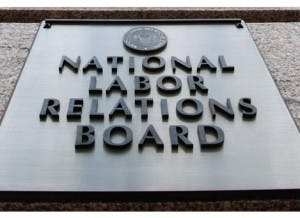By Eric B. Meyer
It’s on now!
Yesterday, the U.S. Chamber of Commerce announced that it had filed a complaint in federal court against the National Labor Relations Board to strike the NLRB’s election rules, passed last month, which would create faster union elections.
Joining the Chamber as plaintiffs in the lawsuit are the Coalition for a Democratic Workplace (CDW), National Association of Manufacturers (NAM), National Retail Federation, and the Society for Human Resource Management (SHRM).
“Déjà vu with the NLRB”
A spokesman for the CDW emphasized that the lawsuit was necessary to protect an election system that has worked for decades:
For nearly 70 years, the NLRB’s election procedures have ensured employees have reasonable time to gather the facts before they cast a ballot for or against union representation. The NLRB’s rule abandons over a half century of successful elections to put the demands of politically powerful unions ahead of employees’ rights to make informed choices and employers’ rights to due process and free speech. This rule was designed to reduce, rather than increase, information for employees and entirely contradicts the spirit behind the President’s promise to have the most transparent administration in history.”
NAM Senior Vice President and General Counsel Linda Kelly described the new election rules as “déjà vu with the NLRB, and American employees are hurt the most by these recycled policies.”
Hindering the ability “to make an informed choice”
SHRM’s President and CEO Hank Jackson also underscored that these rules will have on American employees:
The changes unfairly hinder the ability of employees to make an informed choice about whether or not to join a union. This rule is the latest and most sweeping action by the NLRB to tilt the process toward unionization and prevent employers from effectively communicating with employees, and it should be thrown out.”
Allen Smith, manager of workplace law content for SHRM, reported back in mid-December that the SHRM Board had approved a proposal to join the lawsuit. Smith notes that this is only the third time SHRM has challenged a federal regulation in court.
I’ll keep you posted as to the developments in this action.
This was originally published on Eric B. Meyer’s blog, The Employer Handbook.
